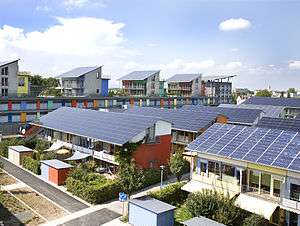Solar Settlement

The Solar Settlement is a 59 PlusEnergy home housing community in Freiburg, Germany. Solar architect Rolf Disch wanted to apply his PlusEnergy concept, created originally with his Heliotrope home, to mass residential production. This residential complex won such awards as House of the Year (2002), Residential PV solar integration award (2002), Germany’s most beautiful housing community (2006). It is the first housing community in the world in which all the homes produce a positive energy balance and which is emissions-free and CO2 neutral. Built between 2000 and 2005 in the Vauban quarter of Freiburg the design of each home offers maximum energy efficiency and turns energy bills into energy income. The Solar Settlement has proved Disch’s vision of a “fundamental environmental imperative” as these homes have exhibited more than 8 years of full occupancy and each produced more than 4,000 Euros ($5,600) each year in solar energy profits. Disch believes the image his community exhibits is equally as important as the eco-savings it brings. Disch says 50 homes that eliminate energy bills and feed clean sustainable renewable energy into the city’s grid is the imperative we need. They contribute towards the goal of sustainable ecological and economic development and show the entire world that communities like this are economical, beautiful, comfortable and in fact preferable. The tenants at the Solar Settlement do not claim to have made any compromises in their living situations but rather that they have both environmentally and economically improved. Made from Black Forest timber, the wood interior and natural lighting provide for happily lit spaces and a natural flow from room to room.
PlusEnergy
PlusEnergy is a coined concept developed by Rolf Disch that indicates a structure’s extreme energy efficiency so that it holds a positive energy balance, actually producing more energy than it uses. With the completion of his private residence, the Heliotrope, in 1994, Disch had created the first PlusEnergy house in the world. The sheer logic of a home that creates more energy than it consumes made perfect sense to Disch. His next goal in its development was thus the mass application of the concept to residential, commercial and retail space. As the concept further developed and gained financial backing as well, Disch built several more projects with PlusEnergy certifications. PlusEnergy is a simple concept that has been materialized in a technical design. “PlusEnergy is a fundamental environmental imperative,” Disch claims.[1] Disch believes that passive building isn’t enough because passive homes still emit CO2 into the atmosphere – we can solar activate our homes!
Community Planning
Community planning goes hand in hand with sustainable development and thus Rolf Disch dedicates much of his design and planning to the symbiosis of his projects' surroundings. A solar community generates identification and an enormous public image. Disch says he attracts great tenants, innovative undertakings and creative work places through his design. Disch always aims to create a community with combined uses for an ecological urban planning concept like traffic management – with wide, attractive walkways, bike routes and connections to public transportation. At the Solar Settlement for example, tenants and owners incorporate bike- and carsharing and the neighborhood has an extensive car-free zone with many public transportation connections. Disch also has incorporated community solutions for energy. For example, a biomass cogeneration unit is extremely expedient, which meets the (reduced) additional heating demands for his PlusEnergy homes.
Awards
2008 German Sustainability Award
2007-08 Japanese PEN-Magazine Creativity Award
2006 Germany's most beautiful housing community
2005 Wuppertal Energy and Environment Prize
2003 Global Energy Award
2002 European Solar Prize
2001 Photovoltaic Architecture Prize Baden-Württemberg
See also
Notes
External links
- Rolf Disch Solar Architecture
- PlusEnergy
- Solar Settlement and Sun Ship Video
- Official website of the Heliotrop (English)
- Freshome.com: brief description with pictures
- Article in Chinese with some pictures of the house (Chamorro)
